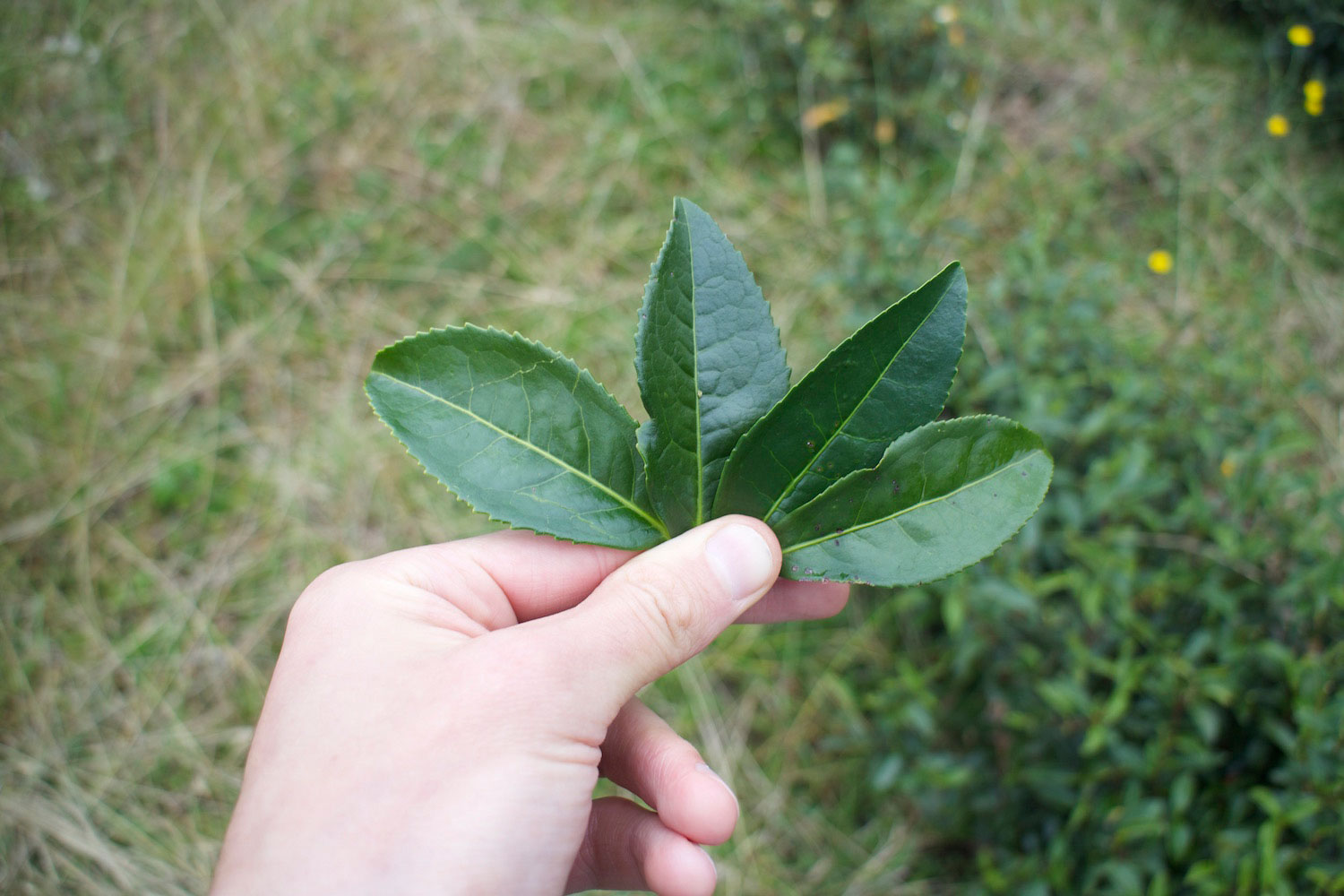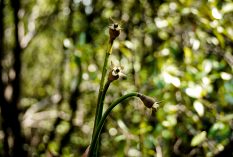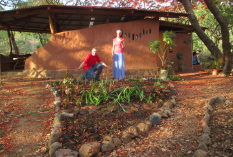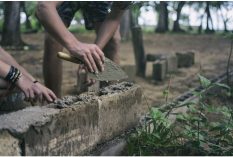At Global Nomadic there are great opportunities to get involved in organic agricultural projects.
Organic farming is a fulfilling but challenging pursuit. In this article we have outlined some of the things you need to know to if you want to be successful in organic farming, based on our experience growing tea organically in China.
If it is these that interest you, read on!
An organic farm doesn’t use synthetic fertilisers or pesticides. This aim, of course, raises some challenges. The issue could be reduced yield when plants succumb to disease. Or maybe the problem is economic in nature – how do you market a salad leaf which a caterpillar has already chewed through? Either way, organic farmers have to come up with ingenious workarounds to stay competitive and face off against rivals who do use industrial techniques. Using chemicals is a quick fix and without this crutch to lean on, organic agriculturists have to take a proactive approach and treat potential problems before they become real issues.
Below, we’ll explore how our organic tea garden approaches the challenges of organic farming.
An organic tea plantation focusing on gourmet tea doesn’t come up against all the issues another crop might – we don’t need to till the soil or rotate crops for one thing, but still, many of the difficulties inherent in organic agriculture can be examined in light of our experiences producing organic tea.
The Difficulties
Economic and societal problems can impede the progress of a small-scale, organic farm and these difficulties are not few. Even organic certification is expensive enough so as to put it out of the reach of many small producers. This would make a fascinating article on its own, but for this post we’ll focus on practical matters – the farming techniques – as they are approached on the ground.
Fertility
Farming is elemental. It depends on sunlight, water, and soil. We control the water and sunlight by selecting the best location. For tea, high in the mountains is best: on the right mountain slope the sun only hits the plants for the hours we need; the rarified air allows the flavour of the plant to develop to its full potential; and the ground is well drained – vital for tea as its roots tend to rot in overly wet conditions.
The ability of soil to drain may be controlled by the location, but the ground where we grow our plants must also be rich in vital nutrients for our tea to thrive. To increase the presence of these essential nutrients in the ground industrial farmers use synthetic fertilisers, but of course organic farms can’t do this. Instead, we control erosion, add natural compost, grow cover crops, and introduce symbiotic associations to enrich the land. All these methods encourage soil fauna and flora and improve soil formation and structure.
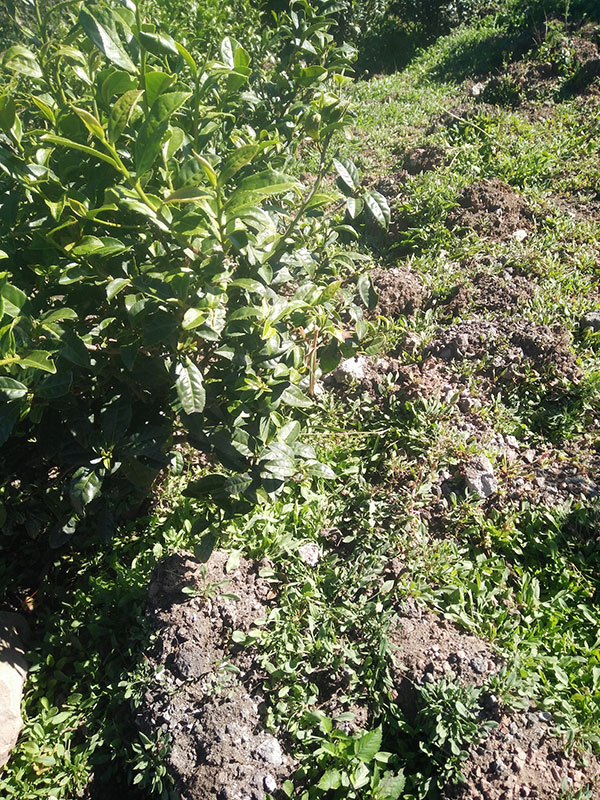
For us, erosion isn’t a problem. Our tea garden is in a basin at the top of a mountain. Yet still, we use the same techniques a farm with an erosion problem might – namely, planting cover grasses, trees and vegetables to bind the soil. The length of time that the soil is exposed to erosive forces is decreased, soil biodiversity is increased, and nutrient losses are reduced, helping to maintain and enhance soil productivity.
To fertilise our farm, we use a mixture of pig manure and flaxseed – both locally sourced, from nearby organic farms. Many farmers plant cover crops, such as nitrate-fixing legumes, but we haven’t opted for this approach. Because we have low levels of soil erosion and the land wasn’t farmed before we started tending it, we have managed to protect and encourage a healthy soil microbiome (the bacterial ecosystem). Once this balance is met – even if the land was parched before the organic enterprise – soil fertility quickly recovers. Quickly, at least, in farming terms – usually it takes about 3 years!
From healthy soils come healthy plants and healthy plants are better at resisting predators and reduce the need for pest control.
Pest Control
Still, bugs like nibbling healthy plants – and who can blame them. Although our tea trees may turn out healthier in the long run, if we want a finished product that is palatable (to humans, not just insects) we have to protect them as best we can.
In large-scale farming operations herbicides, fungicides and insecticides are used. Yet there are simpler, less destructive techniques we can use to achieve the same end. Some organic farmers cover their crops with fabric that allows entry of light and water while screening out insects. However there are other methods.
First off, I should begin with a caveat: we have been very lucky. Before our tea gardens, the land was wild – a balanced ecosystem, and our farmers didn’t destroy this equilibrium when they planted tea. They left an old-growth forest untouched and between the terraces they have planted fruit trees: apple, pear and walnut. There is also a pond for ducks and geese.
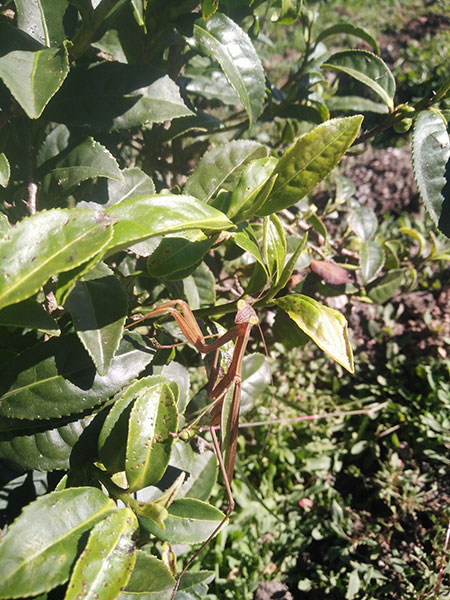
All this biodiversity gives more opportunity for insect-killing parasites to flourish and because we don’t use pesticides, predatory birds, lizards, and the many insects and arachnids help us out too: spiders spin webs among the grasses and ladybirds eat aphids.
Not all plants are created equal. Critters can be as picky as people when it comes to choosing dinner. As such, we allow flowering wildgrasses to grow between the rows of tea plants – a decoy to keep the little gluttons away from the tea.
As luck would have it, all the farms in our area are organic and as such we have to deal with fewer refugee insects fleeing toxic fallout in neighbouring plantations. Other start-up organic farms would have to be more calculated and work much harder to establish a balanced ecosystem and avoid devastating infestation.
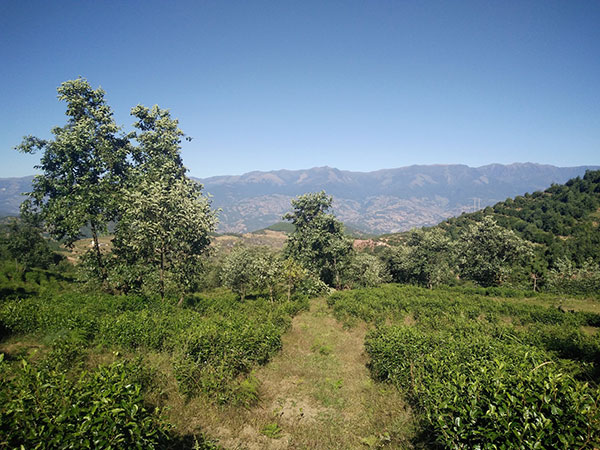
As an aside, for tea farmers, not all insect bites are undesirable – there is a type of tea (Oriental Beauty Tea) where producers go out of their way to attract locusts. After being bitten the leaves produce a chemical which makes the finished tea taste honey sweet. So while we try to minimise exposure to pests, it’s not the end of the world if some leaves get bitten!
To Sum Up
Speaking about the organic process in such a simplified way makes it sound easy, but it is not. A huge amount of care, attention and labour goes into creating and maintaining a balanced ecosystem that not only feeds healthy plants, but also protects them from disease and infestation.
It is a difficult thing for an organic farmer is to watch a weak plant – into which you have sunk countless hours – succumbing to disease and there being nothing you can do do about it. Because weak plants aren’t propped up, only the strongest trees survive. We have a few trees on the farm which are on their way out. Anyone who has gone on holiday and allowed a window plant to dry and shrivel knows how this can feel.
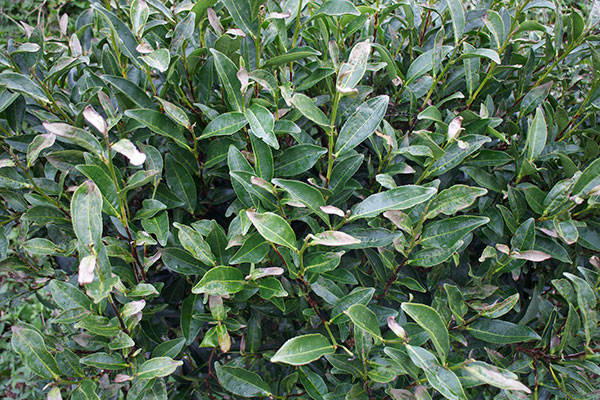
However, the results are worth the hardships. Leaving aside the myriad knock-on benefits a organic farm has for the environment at large. There is something immensely satisfying about understanding the complexity of system and working with that system, not against it to achieve your aim. Moreover, our tea simply tastes better for it. This is down to a number of factors, of course, granted processing and the breed of the plant play a huge role, but, all other variables being equal, truly organic produce has an extra intangible something which makes it all the more delicious. The tea we produce is more vibrant, fragrant and robust than anything we have encountered from non-organic farms.
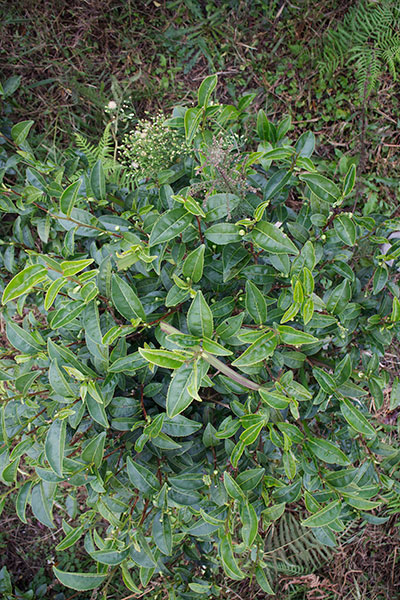
If you have any questions about our methods here, or you would like to know more, drop a comment below and we will be happy to assist!
About the Author
A co-founder of Living Leaf Tea, Edward Allistone is a tea lover, who divides his time between martial arts, photography and teaching. Currently living in Moscow, getting to know Russian tea culture and exploring the city.

